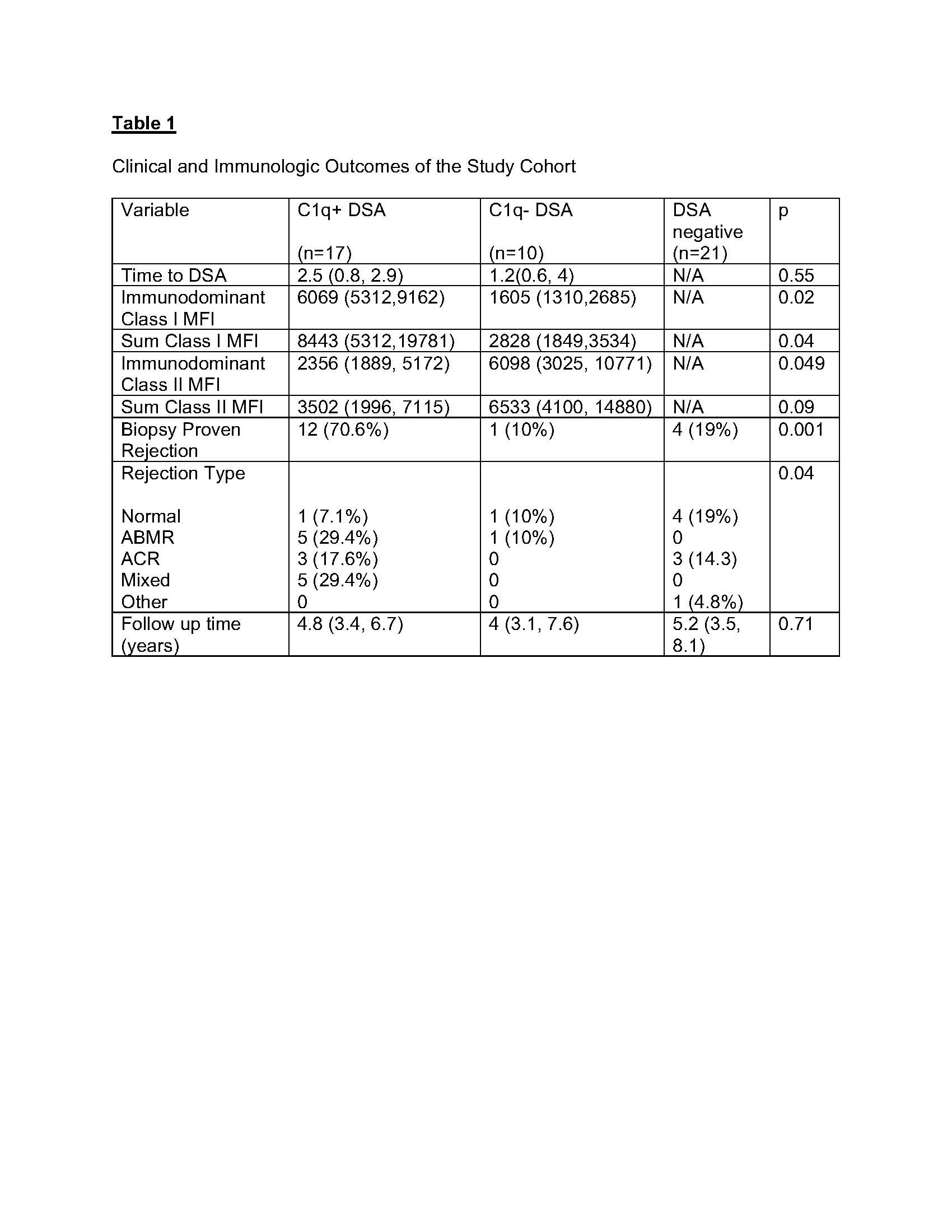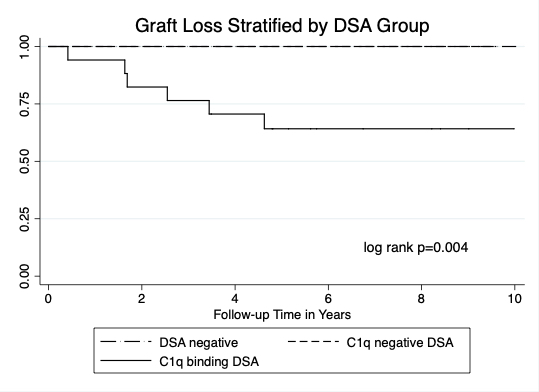The Clinical Significance of C1q+ Antibodies in Pediatric Kidney Transplant Recipients
1Montefiore Medical Center, Bronx, NY, 2Westchester Medical Center, Valhalla, NY
Meeting: 2020 American Transplant Congress
Abstract number: 142
Keywords: Antibodies, HLA antigens, Kidney transplantation, Pediatric
Session Information
Session Time: 3:15pm-4:45pm
 Presentation Time: 4:03pm-4:15pm
Presentation Time: 4:03pm-4:15pm
Location: Virtual
*Purpose: To evaluate the impact of denovo DSA (C1q+ vs C1q-) on graft outcomes in pediatric kidney transplant recipients.
*Methods: Children transplanted between 2009 and 2016 were eligible. Recipients were excluded if post-transplant DSA testing was not performed or were lost to follow up. DSA (both C1q- and C1q+) were measured using Luminex single antigen beads (One Lambda). DSA were monitored in serial samples obtained post-transplant (at 1,3,6,12 months then yearly and when clinically indicated). Patients were grouped as C1q+, C1q- and DSA-.
*Results: A total of 48 subjects met inclusion criteria. The median age at transplant was 12 (5.7, 15.4) years. 69% were males, 43.8% were Hispanic, 29.2% were Black, 8.3% were Caucasian and 18.7% were classified as other. There were no significant differences in the demographics or baseline clinical characteristics between the 3 groups (age, sex, transplant history, immunosuppression). There were no significant differences between the 3 groups with regards to the number of A, B, DR HLA mismatches (p=0.09) or HLA-DR mismatches alone (p=0.18). Of the 48 subjects, DSA developed in 27 (56.3%) during a median follow up time of 4.9 (3.4, 7.9) years. C1q+ DSA developed in 17/27 (63%). In both C1q- and C1q+ groups, the immunodominant DSA was directed in most cases to the donor DQ antigen (90% & 100% respectively). Table 1 shows the clinical outcomes stratified by DSA status. The immunodominant Class I&II DSA MFI values were significantly higher in C1q+ vs C1q- recipients.C1q+ DSA was associated with a significantly higher frequency of biopsy proven rejection (70.6%) when compared to C1q- DSA (10%) and DSA negative transplant recipients (19%); p=0.001. Graft loss was seen in 6 (12.5%) of recipients; all of whom had C1q binding DSA at a median time of 0.82 (0.03, 1.14) years after C1q+ DSA development. Kaplan-Meier curve in Figure 1 shows that there was a significant difference in graft loss between the 3 groups; p=0.004.
*Conclusions: The presence of C1q+ DSA was associated with rejection and graft loss. The HLA antigen seen with C1q+ DSA was most commonly DQ DSA. To reduce the frequency of DSA development, DQ matching should be considered when accepting potential donors and C1q+ DSA should be routinely measured.
To cite this abstract in AMA style:
Hayde N, Solomon S, Colovai A. The Clinical Significance of C1q+ Antibodies in Pediatric Kidney Transplant Recipients [abstract]. Am J Transplant. 2020; 20 (suppl 3). https://atcmeetingabstracts.com/abstract/the-clinical-significance-of-c1q-antibodies-in-pediatric-kidney-transplant-recipients/. Accessed February 26, 2026.« Back to 2020 American Transplant Congress


